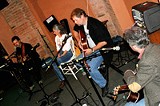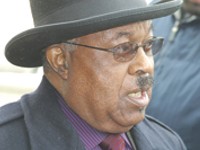All about the song
[
{
"name": "500x250 Ad",
"insertPoint": "5",
"component": "15667920",
"parentWrapperClass": "",
"requiredCountToDisplay": "1"
}
]
Songs used to matter. And to some they still do. Rochester singer-songwriter Brian Coughlin wants to put the song first, and has for the past three years with his monthly Songwriters In The Round series.
On every third Thursday of the month, folks pile into Daily Perks Coffee House to hear an ever-revolving and always engaging cast of artists woodshedding new songs for an attentive, coffee-sipping crowd.
"I would say, for the most part, 90 percent of the songs that we do are finished," Coughlin says.
But every now and then, someone will take a chance.
"I did a song I really wrote the melody to yesterday," says songwriter Maria Gillard. "I hardly ever do that but I thought 'oh, I'm just gonna go out on limb.'" And when she and the others do that, the audience is treated to a truly organic experience as it listens to the song's maiden voyage.
"It's kinda like a living room with an audience," says participant Jeff Riales. "When we write a new song, we like to bring it here when it's fresh and you can barely get the words out."
Coughlin got the idea for the series after seeing it done at The Bluebird in Nashville.
"It was an incredible night and it was all about the song," he says. Coughlin wanted to nurture that environment for songwriters here.
"There's no clinking of glasses, there's not people talking," he says. "It's all focused on the craft of songwriting."
Riales pipes in.
"The espresso machine is the only thing you've got to fight over."
The next Songwriters In The Round Series will feature Patti Witten and Alan Whitney on Saturday, October 16, at Daily Perks Coffee House, 389 Gregory Street, at 8 p.m. Tix: $7. 271-2340. All ages.
--- Frank De Blase
RCSD gets spun
The stalemate over the Rochester City School District's budget deficit may be over. Local members of the state Assembly's Democratic majority reached a deal to release a $20 million spin-up to the district.
But it's coming with strings attached. An audit by State Comptroller Alan Hevesi's office will determine the district's actual deficit, and it will be allowed to spend no more. The remainder of the $20 million will revert to the district's fund balance, "Which is what we were going to do anyway," says Superintendent Manuel Rivera. The district estimates that gap to be between $5.8 and $6.5 million. Rivera downplays the possibility that the audit will reveal significantly different figures.
"That's not going to be the case," he says. "I have confidence in those numbers."
According to Rivera the $7.8 million in past cuts will stand, including 35.9 positions, 25 of them teachers.
But 37 more jobs that were on the line will be saved. Rivera expects the audit to be done in two to three months. If it does reach a substantially different conclusion, however, Rivera admits that still more cuts would have to be made.
Rivera believes that tying the ability to spend the additional money during this year to the results of the audit was the deal-clincher. Assemblymember David Gantt, who'd been blocking the loan, had called for an audit and a blue-ribbon panel, both steps the district has since taken.
So does this spell an end to the standoff between Gantt and the school district? Rivera has no direct answer.
"What I really hope is [that] everyone who's ever been critical of the district can get a third-party report," he says.
School budget scrutiny begins
A task force headed by RIT President Al Simone will analyze the Rochester school district's financial-management practices. The task force was appointed last week by Superintendent Manuel Rivera, in response to continued criticism about the way the district constructs and manages its budget, and the way it spends its money.
Rivera also announced that beginning with the 2005-06 fiscal-year budget, the district will format its budget the same way as the city does. Rochester Mayor Bill Johnson has complained that the district's budget is confusing, and that the format changes from year to year, making it impossible to track spending.
The study by the Simone task force will be an extensive one. It will analyze how effectively the district has responded to previous third-party studies. It will analyze trends and factors that affect the district's revenue and expenses, why expenses have continued to grow while enrollment has dropped, and whether the increase in expenses has improved student achievement.
It will compare the salaries and benefits of district employees with those of other school districts and with the market in general. It will analyze the district's goals, which include student achievement, and it will assess how the district allocates its revenue --- and whether the district has enough money to achieve its goals.
The task force is a diverse one, with representatives of the business community, community organizations, and higher education. In addition to Simone, members of the task force are Carlos Carballada, chair of the M&T Charitable Foundation Rochester Funds and former chancellor of the New York State Board of Regents; Joan Roby-Davison, executive director of Group 14621; Paul Haney, an accountant and former Rochester city councilmember; Stephen Jones, superintendent of the Syracuse school system; Emeterio Otero, executive dean, Monroe Community College; Sandy Parker, Rochester Business Alliance CEO; the Rev. John Walker of Christian Friendship Missionary Baptist Church, and Dr. Arthur Walton, dean of the St. John Fisher School of Education.
The selection of Stephen Jones of Syracuse means that the task force will have input from someone familiar with the complex revenue stream, budgeting practices, and educational challenges of the state's large-city school districts.
Rivera didn't set a date for the group to report back, but Simone says he expects that the study will be completed by the end of this calendar year or early next year.
Water level watch
Waiting. That's what Lake Ontario shoreline residents were still doing Thursday after a public forum on the Lake Ontario-St. Lawrence Study.
One hundred or so lakeside property owners from across the county flocked to the Greece Town Hall to hear about the study, which is focused on water levels on the lake and the river upstream from the Trois-Rivieres, Quebec.
After the St. Lawrence Seaway was constructed in the 1950s, the International Joint Commission, which regulates US-Canadian boundary waters under a 1908 treaty, set up some criteria for regulating water flows on the two bodies. Commercial navigation and hydroelectric power (generated by the New York Power Authority at the Moses Saunders Dam in Massena) were the only significant concerns.
Since then, there's been a growing understanding of things like the ecological impact of fluctuating water levels, and the importance of recreational boating on local economies around the Great Lakes basin. The study --- now in its fourth out of five years --- is trying to take those things into account.
Those present Thursday didn't say they thought the study was failing. They just weren't sure. During a question-and-answer session over a teleconference link with a similar hearing in Dorval, Quebec, most people wanted to know more. One man, speaking from Dorval through a translator, garnered applause from the Greece attendees when he said he thought the study would have more comprehensive preliminary results to share by now.
Study officials shared the optimum high- and low-water levels deemed acceptable by Technical Working Groups in about a dozen categories, but had little else to offer stakeholders in the way of information gathered by the study so far.






